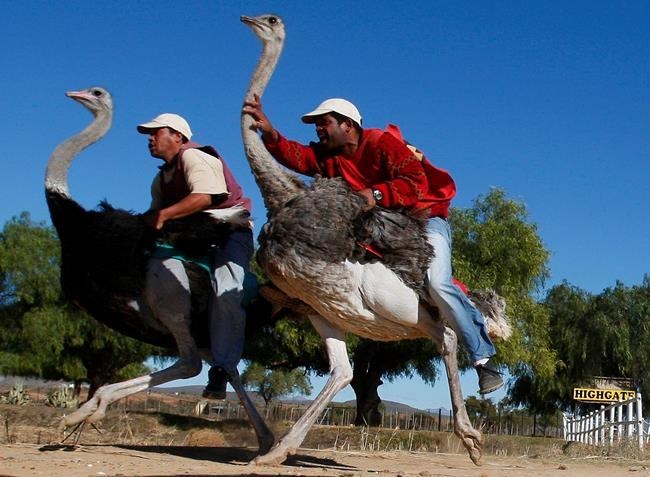
FILE -- In this Sunday, June 27, 2010 file photo two men compete in an ostrich race at Highgate ostrich farm in Oudtshoorn, South Africa. Clambering onto an ostrich for a ride used to be popular among tourists in a South African town of Oudtshoorn known of as the “ostrich capital of the world.” Not so much anymore. Two major ostrich farms in Oudtshoorn have stopped offering ostrich rides to tourists, responding to concerns about the birds’ welfare. A third farm is sticking with the feature, saying it is regulated and that ostriches do not experience discomfort.. The Highgate farm, however, continues to offer ostrich rides.(AP Photo/Shuji Kajiyama, File)
Republished May 22, 2017 - 8:12 AM
Original Publication Date May 22, 2017 - 5:14 AM
JOHANNESBURG - Clambering onto an ostrich for a ride used to be popular among tourists in a South African town known as the "ostrich capital of the world."
Not so much anymore.
Two major ostrich farms in the Oudtshoorn area have stopped offering ostrich rides to tourists, responding to concerns from European clients and others about the birds' welfare. A third farm is sticking with the feature, saying its regulations include tourist weight restrictions and that an ostrich does not experience discomfort while trotting with someone on its back for 10 seconds or so.
The debate is part of a wider discussion in Africa and beyond about the ethics of human interaction with certain animals for entertainment or other purposes. Ostrich farmers stress that riding an ostrich is different from riding an elephant, which would need to be trained. Nor, they say, can it be compared with the petting of lion cubs, whose time in captivity prevents them from learning how to survive in the wild.
But ostrich rides, which used to be "something that really captured the imagination," are now viewed with distaste by many clients, said Douglas Bester, owner of Cango ostrich farm in Oudtshoorn. The farm scrapped rides at the end of February.
"It's a market demand," Bester said, adding: "It's more ethical to teach kids to love the birds than to sit on them and have fun laughing when someone falls off."
Oudtshoorn is in South Africa's arid Karoo region and ostriches were first farmed there for their feathers in the 19th century. Feathers ranked fourth behind gold, wool and diamonds in the value of South African exports before World War I, whose economic fallout devastated the ostrich industry, according to the website of the Safari Ostrich Show Farm. Besides feathers, there is also a market for ostrich eggs, meat and leather.
The Safari farm started regulating ostrich rides about 15 years ago, eventually lowering the weight restriction for tourists to 60 kilograms (132 pounds), and dropped the practice altogether on May 5, said marketing manager Billy Engelbrecht.
"We saw that a lot of our local and international tourists weren't that keen on riding ostriches anymore, like they would have been 40 or 50 years ago," Engelbrecht said.
Highgate, another ostrich farm, still offers rides in its tours, which include a visit to a breeder room where ostrich chicks hatch and an "ostrich derby" in which employees race on the birds while tourists watch. The farm does not allow anyone above 74 kilograms (163 pounds) to sit or ride on an ostrich, which can easily carry a weight of 90 kilograms (198 pounds), said owner Johan Keller.
"The ostriches experience no pain or discomfort with any of these activities," Keller wrote in an email. He said: "Our birds are happy birds."
___
Follow Christopher Torchia on Twitter at www.twitter.com/torchiachris
News from © The Associated Press, 2017